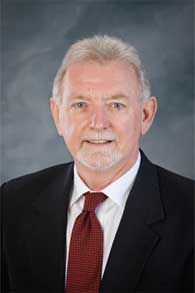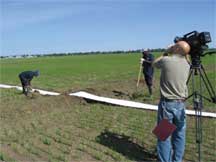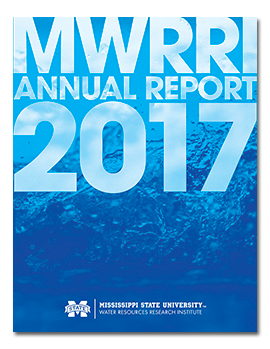FROM THE DIRECTOR

Greetings from the Mississippi Water Resources Research Institute. This quarter brings to a close my first year as Director. I feel we have made a successful transition.
During the past year I made a concerted effort to make as many contacts as possible with our stakeholders to raise the visibility of the Institute. The tally for the first year was 81, and included conference presentations, public meetings, and individual visits all over the state of Mississippi, as well as Washington D.C. So far, in 2012, I have made 51 such contacts. I feel these networking efforts will pay dividends in the future.
In April we hosted our annual conference in Jackson at the Hilton on County Line Road. A more complete summary of the event is provided below. I was very pleased with the number of attendees, and the quality of the presentations. We received very positive feedback from our exit survey about the facilities and location as well as conference content. And even though we eliminated some of the students registration fees, we showed a small profit. I would like to thank all the Advisory Board members who were involved in the planning effort, and a special thanks to Jessie Schmidt for her tireless efforts to make sure the conference was a financial and educational success.
Another important event occurred this spring. The Institute normally receives funding from the state of Mississippi to use as match for external grant applications. Last year we received $120,531. This year our funding was increase to $180,531. A 49.8% increase!! We will use a significant portion of that increase to fund REACH, an exciting new water quality improvement initiative started by Dr. Robert Kroger. A complete description of the program may be found below.
Enjoy. And have a safe summer.
FUNDING OPPORTUNITIES
2013 USGS Annual Competitive RFP Coming Soon

During the month of June, the Institute's Advisory Board will be finalizing the RFP for our annual proposals. The call will closely follow the same format as was issued in 2012.
The Institute hopes to release the complete package around the first of July, but research scientists who plan to submit should be developing their research ideas and forming their teams now. Significant external matching funds will be valued highly.
Once again, consideration will be given to junior (non-tenured) faculty and research scientists acting as Principal Investigator. Senior faculty are encouraged to serve as Co-Pi's. Graduate student participation is also encouraged.
ANNUAL MEETING
2012 Mississippi Water Resources Conference
Water, Sustainability, and Climate
April 3-4, 2012
More than 150 participants, 26 of which were students, gathered in Jackson, MS at the Hilton Hotel April 3rd and 4th to take part in the 2012 Water Resources Conference. Over the course of a day and a half, nine invited speakers and 59 presenters shared information focusing on the conference theme of "Water, Sustainability, and Climate". The conference was well attended by water researchers from all across the South. But the award for highest mileage claim goes to Ms. Guisy Pappalardo, who travelled all the way from Sicily. Guisy will be a visiting Fulbright Scholar at Mississippi State University this fall, working with staff in the Water Resources Research Institute and Department of Landscape Architecture as she completes her PhD at the University of Catania.
Student presenters competed for first- and second place monetary awards in both oral and poster presentations categories. Of 20 poster presentations, eight were delivered by students. Winning first place was Natalie Sigsby, a graduate student in Mississippi State University's Department of Civil Environmental Engineering. Natalie's poster was titled "Sedimentation Processes of Perdido Bay." Second place went to Min Lee, who is a graduate student in Mississippi State University's Department of Forest Products. Min's poster was titled "Formaldehyde released in leachate from medium density fiberboard (MDF) buried in a simulated landfill."
Twenty students made oral presentations during the conference. Caroline Andrews, a graduate student in Mississippi State University's Department of Wildlife, Fisheries & Aquaculture received first place for her presentation on "Predicting nitrogen and phosphorus concentrations using chlorophyll-a fluorescence and turbidity." Alex Littlejohn, a graduate student in Mississippi State University's Department of Wildlife, Fisheries & Aquaculture, garnered second place for his presentation on "Low-Grade Weirs: An Innovative Best Management Practice for nitrate-N Mitigation." Special thanks go to Mississippi Water Resources Research Institute, Mississippi Water Resources Association, Weyerhaeuser Company, and Yazoo- Mississippi Delta Levee Board for sponsoring the student competition awards.
The luncheon speaker on Tuesday, April 3 was Eric Evenson, USGS Coordinator for the National Water Census since 2008. Mr. Evenson has been with the USGS since 1992, having also served as Associate District Chief and District Chief, and Regional Program Officer in the Northeastern Region Water Program. Mr. Evenson's presentation reviewed current projects and themes in the Survey's Science Plan as prioritized by USGS as well as changes and modifications to enhance the program throughout the country.
Wednesday's luncheon speaker was Stephen Kirkpatrick, wildlife and nature photographer. Mr. Kirkpatrick's latest presentation, Sanctuary, is a tribute to rare and endangered species and habitats of the Mississippi Coastal Plain.
Sponsors for the conference included Florence & Hutcheson, Inc., G.E.C. Inc., Michael Hatcher & Associates Inc., Mississippi Department of Environmental Quality, Mississippi State University Department of Geosciences, Mississippi State University Department of Landscape Architecture, Mississippi Water Resources Association, Mississippi Water Resources Research Institute, U.S. Geological Survey, Weyerhaeuser Company, and Yazoo-Mississippi Delta Levee Board. Exhibitors present at the conference included Florence & Hutcheson Inc., G.E.C. Inc., Mississippi Department of Environmental Quality, Pickering Firm, Inc., REACH program facilitators, and U.S. Geological Survey.
PROFILE
WRRI Summer 2012 Profile
Researchers: Joseph Massey, Plant & Soil Sciences, Mississippi State University
Project: Water-Conserving Irrigation Systems for Furrow and Flood Irrigated Crops in the Mississippi Delta

Mississippi's total water use is over 3.0 billion gallons per day (BGD). Irrigation of agricultural crops accounts for over 60% of that amount. Mississippi relies heavily on agricultural commodity production as a source of revenue and jobs. And rice, one of Mississippi's top commodities and exports, relies heavily on water for germination and growth. Unfortunately the demand for water use for irrigated crop production has put enormous pressure on Mississippi Delta's Mississippi River Valley Alluvial Aquifer groundwater supply. The Mississippi Water Resources Research Institute (MWRRI) is working with researcher Dr. Joe Massey, an Associate Professor of Plant and Soil Sciences at Mississippi State University, to find alternatives to current rice cultivation practices that might result in less water required to produce the same amount of rice.
Massey's MWRRI-sponsored research has shown that intermittent irrigation can reduce the amount of water needed to grow a successful rice crop by up to 50 percent, compared with the conventional method of continuous flooding. Another find was that managing a rice flood by maximizing the distance between the water level and the top of the levee gate can reduce overall water use by minimizing over-pumping and runoff. He also designed a rain gauge that helps farmers tell from a distance how wet their fields are, and he's now researching ways to remotely and automatically shut off water pumps to save rice producers time and money.
Data generated by Dr. Massey's previous research indicate a potential savings of 150,000 acre-feet of irrigation water on rice alone. Less water pumped results in reduced production costs. If Dr. Massey's research was implemented on only 200,000 of the 310,000 acres of rice planted in 2010 in the Delta, it could easily result in over $5,000,000 in reduced production fuel costs. This is quite a potential return on the $18,039 of federal funds invested in Dr. Massey for FY 2011.
FEATURE
REACH
Research and Education to Advance Conservation and Habitat
REACH is an innovative, grass-roots collaboration that will integrate research and outreach on specific farms to demonstrate the benefits of conservation on agricultural lands. The products developed by this program will be used to further conservation delivery and adoption in agriculture.
There is increasing societal awareness of natural resource concerns in both agricultural systems and the downstream receiving water bodies. These concerns are reflected in current policy discussions at both Federal and State levels, where there is a desire for 1) increased accountability with regard to agriculture's impact on the environment, and 2) documentation of how well on-the-ground programs and conservation practices are doing to improve our natural resources. REACH is a producer led program that will address these two points.
The REACH program goal is to create a network of cooperative farms in Mississippi, with variable agricultural systems, degrees of conservation initiatives and ecosystem monitoring to illustrate the success of conservation practice implementation on landscape stewardship. These farms will provide producers, conservationists, educators and policy maker's key information to better implement and advocate management practices orientated around various local and regional objectives (i.e., targeted nutrient reductions, or habitat restoration).
The REACH program will be a MSU-extension steered program that is strategically implemented to leverage, sustain, and continue the efforts of regional and state led strategies. "REACH is the perfect marriage of research and extension, and its sole purpose is to help the farming community," Kroger said. "REACH will be a service to Mississippians to help improve landscapes, and will showcase what a good job landowners are doing."
"Critical to conservation practice implementation and adoption is the know-how of how it works, why it works, and the ability to deliver the relevant information to who it can help" said Dr. Gary Jackson, Director of Mississippi State Extension Service. "REACH will help our landowners to foster improved landscape stewardship and agricultural production systems by giving them the hands-on help they require." REACH plans a multi-year, multi-farm program that will generate research-based results, create opportunities for field days and demonstration sites, provide justification for federal investments in conservation and support the health of Mississippi's water resources, both inland and downstream to the Gulf of Mexico.
For more information contact Dr. Robert Kroger. His e-mail address is rkroger@cfr.msstate.edu. His office phone number is 662.325.4731.
ABOUT WRRI
Mississippi Water Resources Research Institute (MWRRI)
The mission of the Mississippi Water Resources Research Institute (WRRI) is to provide a statewide center of expertise in water and associated land-use and to serve as a repository of knowledge for use in education, research, planning, and community service. The WRRI goals are to:
- Serve public and private interests in the conservation, development, and use of water resources.
- Provide training opportunities in higher education whereby skilled professionals become available to serve government and private sector alike.
- Assist planning and regulatory bodies at the local, state, regional, and federal levels.
- Communicate research findings to potential users in a form that encourages quick comprehension and direct application to water related problems.
Two Year Strategic Plan 2011-2013
Research
- Continued support for food/fiber/fuel mission.
- Added focus on urban storm water issues, especially water quality.
- Assess Green Infrastructure solutions for waste water treatment.
- Investigate innovative monitoring solutions for BMP effectiveness.
- Enhance working relationships with other Universities.
- Quantify outcomes from WRRI research and support funding.
- Develop a Certificate of Watershed Protection. This could be offered to traditional on-campus graduate students as well as to off-campus professionals utilizing distance learning.
- Utilize demonstration projects as service learning.
- Expand the number of funded graduate students.
- Offer workshops for technology transfer and revenue generation.
- Return the annual conference to Jackson, MS.
- Revise the conference agenda to reflect desire for more applications.
- Expand working relationship with MSU Extension.
Discrimination based upon race, ethnicity, religion, gender, national origin, age, disability, or veteran's status is a violation of federal and state law and MSU policy and will not be tolerated. Discrimination based upon sexual orientation or group affiliation is a violation of MSU policy and will not be tolerated.

